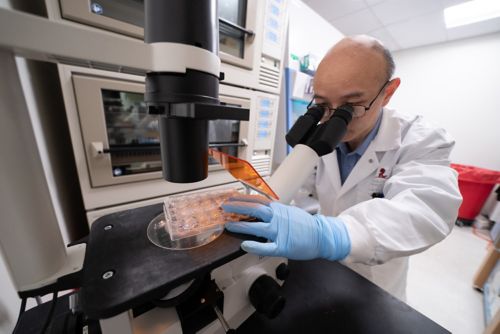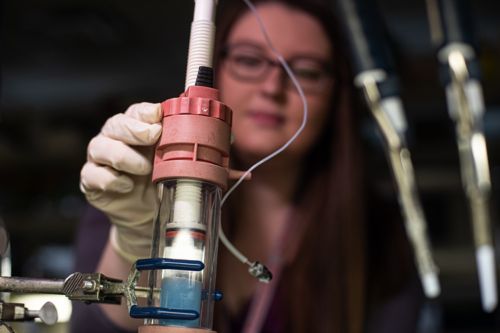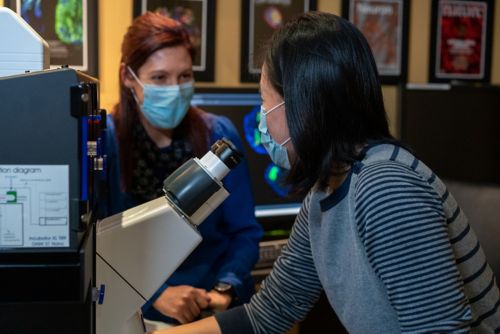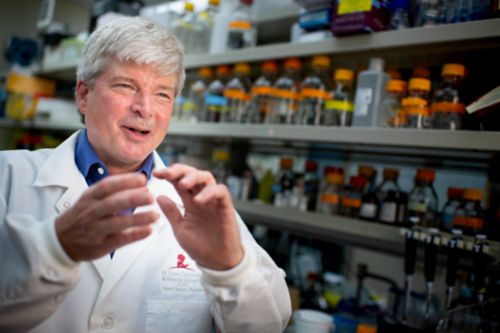St. Jude Family of Websites
Explore our cutting edge research, world-class patient care, career opportunities and more.
St. Jude Children's Research Hospital Home

- Fundraising
St. Jude Family of Websites
Explore our cutting edge research, world-class patient care, career opportunities and more.
St. Jude Children's Research Hospital Home

- Fundraising
Kriwacki Lab
Exploring the role of phase separation by intrinsically disordered proteins in biological processes and disease mechanisms
About the Kriwacki Lab
Proteins that lack fixed structure interact with many other molecules and play a role in several biological processes. Their underlying functions, however, are poorly understood. Our laboratory seeks to fill this knowledge gap by investigating proteins that form fluid cellular compartments that regulate several important processes. The formation and behavior of these compartments can contribute to cancer and other diseases.

Our research summary
The research in our laboratory focuses on how intrinsically disordered proteins and other biomolecules undergo the process of liquid-liquid phase separation to form biomolecular condensates. We conduct in vitro studies to understand the features and interactions of biomolecules and translate our understanding of molecular mechanisms to explaining how biomolecules interact in cells – in the context of phase-separated biomolecular condensates – to perform a wide variety of biological functions.
One area of research in our laboratory centers on a particular membrane-less organelle, the nucleolus. We have been major contributors to the molecular-level understanding of how biomolecules interact within the nucleolus and promote ribosome biogenesis. We are exploring how the nucleolus mediates stress responses, particularly oncogenic stress responses. Specifically, we are studying how the tumor suppressor protein ARF – through its interaction with nucleolar proteins – alters the structural and dynamic features of the nucleolus and how the effects of that alteration inhibit ribosome biogenesis. Our laboratory previously performed a variety of detailed, structural, and biophysical studies in vitro to gain mechanistic insight into ARF’s activity in cells. We are now conducting cellular studies using advanced fluorescence microcopy and biochemical methods to study the effects of ARF on the functions of the nucleolus.

The other major area of research in our laboratory focuses on fusion oncoproteins that are drivers in many different types of cancer, particularly pediatric leukemias. We are testing the hypothesis that fusion oncoproteins drive the formation of aberrant transcriptional condensates through the process of phase separation, and whether these condensates go on to drive aberrant gene expression that leads to oncogenesis. Our laboratory is involved in a large collaborative project with colleagues in Pathology and Chemical Biology & Therapeutics focusing on NUP98 fusion oncoproteins, which are drivers in pediatric acute myeloid leukemia. We are now conducting cell-based studies to link the process of phase separation by NUP98 fusion oncoproteins with cell transformation and oncogenesis and identify small molecules that can disrupt the aberrant transcriptional condensates caused by NUP98 fusion proteins. In a separate project, we are testing our phase separation hypothesis through studies of over 100 fusion oncoproteins recurrently observed in a diverse array of both pediatric and human cancers. The results to date show that the majority of fusion oncoproteins tested form phase separated condensates in cells, opening to door to future studies of links between phase separation by fusion oncoproteins and the molecular mechanisms that underlie oncogenesis.

Selected Publications
Contact us
Richard W. Kriwacki, PhD
Structural Biology
MS311, Room M7434
St. Jude Children’s Research Hospital
Follow Us

Memphis, TN, 38105-3678 USA GET DIRECTIONS
